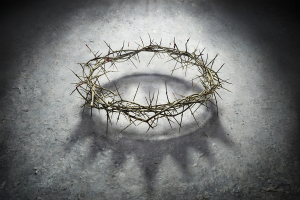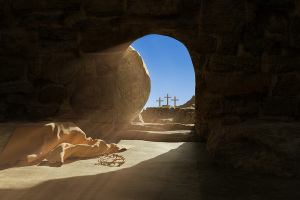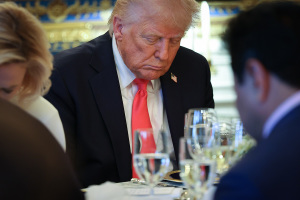We must dare to start holy confrontation

Throughout my life, I have often found myself in positions that required me to confront people who have so much more — more power, more intelligence, more money, more authority — than I do.
At various times I have been led by God to confront elected officials in the community, business owners with considerable clout, angry members of my congregation, international ministry leaders, and even presidents from both major political parties in the White House!
My desire each time I am called to engage in holy confrontation is to advance God’s Kingdom and to uphold His truth. I never confront another person in anger or, to the best of my human ability, to advance my own agenda. When I have confronted political leaders and presidents of both parties, I have maintained my devotion to only one cause — not the “donkey’s” or the “elephant’s” cause but the Lamb’s. I cannot say that I enjoyed any of those sometimes tense, often emotionally charged, conversations. But each one forced me to rely on God and the power of the Holy Spirit just a little more as I submit to His authority.
During those challenging seasons of confrontation, I prayed without ceasing for God’s guidance, wisdom, and understanding. I sought to emulate the only perfect person who has ever walked this earth — my Lord and Savior, Jesus Christ. And I relied on the supernatural power of the Holy Spirit to work through me and others in order to accomplish what He had called me to do. Perhaps you have been in a similar situation: If you did not speak up about an injustice, no one else was going to.
Perhaps you have been challenged in your employment, where the voices of those who are being wronged are also being ignored. Or maybe your church family has missed the mark and slid into a stance that is clearly immoral. Maybe even in your family a biblical truth is being ignored and poisoning the sanctity of your home.
Whether we are intimidated by a cultural climate of cancellations and criticism or fear the fallout from standing firm in our faith, we must muster the courage of Elijah, who confronted King Ahab. God’s prophet had declared that rain would not fall, a way of commanding everyone’s attention by suffering the consequences of a life-threatening famine, a season Elijah and others survived only through the provision and protection of God.
As the famine stretched into its third year, God told Elijah that it was time for a more direct confrontation: “Go and present yourself to Ahab, and I will send rain on the land” (1 Kings 18:1). Elijah set off immediately to see the king, but before reaching him, the prophet encountered Ahab’s palace administrator, Obadiah, identified as “a devout believer in the Lord” (verse 3) who had worshiped the Lord since his youth (see verse 12). As evidence of his faithfulness, Obadiah had hidden a hundred prophets in two caves, providing them with food and water, and protecting the murderous intent of King Ahab’s wife, Jezebel.
Elijah instructed Obadiah to go tell the king that the prophet would meet him face to face. The faithful Obadiah, however, was fearful of his master’s wrath concerning the prophet.
“No problem,” Elijah basically replied. “I’ll tell him myself!”
Ahab, upon seeing his least favorite person approaching, greeted Elijah with these words: “Is that you, you troubler of Israel?” (verse 17).
Elijah deflected the accusation into a true reflection of the situation: “I have not made trouble for Israel ... But you and your father’s family have. You have abandoned the Lord’s commands and have followed the Baals” (verse 18). In other words, “I’m not the problem — you’re the problem!”
The political, social, and cultural divisiveness in our nations and our world requires us to stand apart from the majority, to go against the powerful, and to confront the privileged. Now perhaps more than ever, we are called to act on behalf of the poor, the weak, the defenseless, the disenfranchised, the orphans, and the widows. To stand up for what we believe, for what we know is right, for the truth found in the living Word of God. But standing up for the truth is rarely comfortable, convenient, or convivial.
It is so much easier to go with the flow, to back away from the battle, to look the other way. Even when immorality, greed, perversion, murder, and idolatry assault our lives on a daily basis, we may be reluctant to voice opposition because there will be a price to pay, consequences to contend with, and changes to make. We risk being “unfriended” and “unliked” on social media, being criticized and chastised by opponents who do not even know for what and whom we stand.
In our divisive world of political animosity and civil unrest, we often allow the mantle of holy confrontation to fall from our shoulders. Rather than speak up for what is right in the eyes of God, we hold our tongues in order to conform to the consensus. Instead of calling out injustice, unrighteousness, immorality, and idolatry, we avoid rocking the boat.
When we exercise the mantle of holy confrontation, we may, like Elijah, be viewed as a troublemaker and instigator. Our opponents may call us names or try to influence others so that they may join forces against us. Our adversaries will silence us by any means necessary.
That is when we must dare to start holy trouble.
Chosen Books, a division of Baker Publishing Group, Persevere with Power by Samuel Rodriguez, 2021, Used by permission.
Rev. Samuel Rodriguez is president of the National Hispanic Christian Leadership Conference, executive producer of “Breakthrough” with 20th Century Fox and author of “From Survive to Thrive: Live a Holy, Healed, Healthy, Happy, Humble, Hungry, and Honoring Life” (Charisma House Publishing), a best-seller on Amazon. CNN and FOX News have called him “the leader of the Hispanic Evangelical movement” and TIME magazine nominated him among the 100 most influential leaders in America.



























